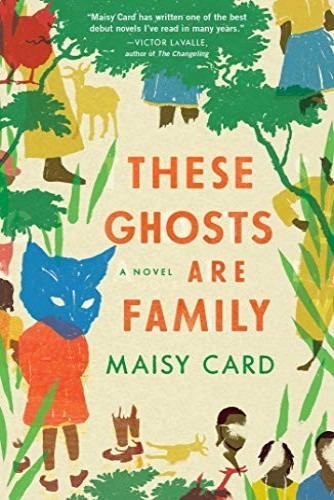
These Ghosts Are Family
A Novel
- اطلاعات
- نقد و بررسی
- دیدگاه کاربران
نقد و بررسی

Starred review from January 6, 2020
Card’s profound, assured debut explores Jamaican colonial history to uncover a family’s painful past. Spanning two centuries and eight generations of the Paisley family, the narrative begins in 2005 with Stanford Solomon, a Jamaican immigrant to the United States who was once known as Abel Paisley before faking his own death 35 years earlier, assuming his dead friend’s identity, and estranging himself from his family. After Stanford finally reaches out to his daughter, Irene, a 37-year-old home health aide in New York City, to confess that he’s been alive all this time, her late mother, Vera, a ghost who spent decades without knowing what happened to her husband, notes that “death is just one long therapy session.” Meanwhile, Stanford’s daughter by a second marriage, Estelle Solomon, struggles with heroin addiction and grief that she cannot support her 18-year-old daughter. As Card traces the family’s roots back through Jamaica’s history under British rule and enslavement, literal and figurative ghosts animate the novel, and a wrenching description of the violent 1831 Christmas Rebellion and its aftermath reveals that Stanford was not the first of the Paisleys to rewrite the history of their lineage. Through a fluid blend of patois and erudite descriptions of Jamaica, Card offers a kaleidoscopic portrait of a troubled but resilient family whose struggles are inscribed by the island they once called home. This masterful chronicle haunts like the work of Marlon James and hits just as hard. Agent: Monica Odom, Liza Dawson Associates.

January 1, 2020
Generations of a Jamaican family grapple with the legacy of slavery and secrets. "Perhaps, a life does not belong exclusively to one person," thinks a character in Card's debut novel, a rich and layered story about several generations of a Jamaican family. Secrets, Card shows, are part of what bind us together. One of this family's biggest secrets involves Abel Paisley, who leaves Jamaica for England in the 1970s. When another Caribbean dock worker is killed in an accident and the white workers mistakenly think it's Abel, Abel assumes the dead man's identity. Abandoning his wife, Vera, and two young children, he marvels over "the one time racism worked" in his favor. Abel marries again and builds a new life in New York as the proprietor of a West Indian market, which turns out to be difficult in all new ways. But Card's story doesn't end there. She's only just beginning. A public librarian who was born in Jamaica and raised in Queens, she brings to life Abel's ancestors and descendants and those whose lives intersect with theirs, among them Abel's abandoned wife; the servant who loved her; a precocious out-of-wedlock granddaughter; and the white descendant of the plantation owner who once enslaved and terrorized the family. This is a wonderfully ambitious novel: It sprawls in time from the uncertain present to the horror of slavery on a Jamaican plantation, examining racism, colorism, and infidelity and how they obscure and fracture a lineage. A gifted storyteller with an eye for detail and compassion for all her flawed characters, Card ends the book with an unsettling ghost story about insatiable hunger. We all hunger for something, she tells us: love, acceptance, freedom, an understanding of the past to know who we are, because our lives are never just our own. An intriguing debut with an inventive spin on the generational family saga.
COPYRIGHT(2020) Kirkus Reviews, ALL RIGHTS RESERVED.

February 1, 2020
DEBUT Stanford Solomon is not who he says he is. Beginning life as Abel Paisley, he left Jamaica for London in 1970 so that he could earn more money for his family and escape his unhappy marriage. A freak accident in London allowed him to assume his partner's identity and fake his own death. He then started a new life in New York, married again, and created a new family. More than three decades later, circumstances compel him to bring his families together and let them in on his secret. His revelation meets with mixed reactions, explained by each participant traveling back in time to tell their own story. Card weaves a multigenerational narrative that tackles racism, colonialism, slavery, immigration, infidelity, and family ties--and just about every other issue of the modern age. VERDICT Set in both Jamaica and New York, this debut novel effectively reveals contrasting cultures and customs. Though the Jamaican patois requires close attention, readers of general fiction will enjoy unraveling the threads of this complex tale. [See Prepub Alert, .8/5/19.]--Joanna Burkhardt, Univ. of Rhode Island Libs., Providence
Copyright 2020 Library Journal, LLC Used with permission.

Starred review from December 1, 2019
Across generations, a family reckons with the ghosts of enslavement's legacy in this stunning, kaleidoscopic debut. In an opening revelation, readers learn that Stanford Solomon intends to reveal his life's secret: he used a tragic accident as an opportunity to reinvent himself. Taking his dead friend's name, he severed ties with the wife and children relying on him in Jamaica and started over in New York, creating a new family. Card invites readers to imagine themselves as a series of characters, one by one, in the moments before this revelation upends their identities, and such inventive narrative techniques continue throughout the novel. Present-day family members are deeply affected by the enslavement and rape of some of their ancestors, perpetrated by other ancestors, in colonial Jamaica. Card relates the messy, complicated, and difficult process of coming into this awareness. A white descendant who benefits from family money is bequeathed an ancestral enslaver's journal, the stuff of nightmares. What to do with it? Allow scholars to study it? Allow descendants of the enslaved to glean information long denied to them? Card's clean, readable prose provides an important counterbalance to the dense, heavy problems her broad scope of characters endure. A fantastic debut.(Reprinted with permission of Booklist, copyright 2019, American Library Association.)




دیدگاه کاربران